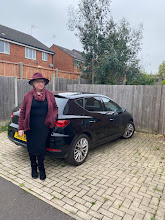Finale.
We shook hands all around.
It seemed that we had bought our dream house.
Let the future begin!
One stroke of good fortune was discovering that the B & B landlady’s husband was a civil engineer. The agent told us that French people don’t usually bother with a survey before purchasing a property, merely doing structural work as and when needed. However, we had been conditioned to seek some sort of survey so were pleased to find an English professional to give our property the once-over before the end of the seven day cooling off period which purchasers are given in France before signing the compromis de vente or to retract after having signed the deed.
‘Just as well we found the house in our first week then,’ responded him indoors to this news. And, of course, he was right. It meant that we could await the engineer’s report and, if all was well, sign the agreement before leaving France. We discovered that house purchase solicitors in France are called notaires, and unlike in England, are disinterested parties to the transaction, i.e. they act for neither the vendor nor the buyer. They seem to act solely for the government, as far as I could see. We learned that the seven day cooling off period runs from the date on which the notaire notifies the potential purchaser of the completed draft deed of sale or gives him a copy in return for a signed receipt. Apparently the deed of sale may not be signed before the expiration of this period.
We needed also to ensure that our compromis agreement contained the following provisions:
identification of the property being sold (well yes!);
a guarantee of the absence of asbestos;
certificates regarding elimination of termites, lead etc.;
the terms of the purchase;
the price and date of payments (‘hah hah,’ from you know who);
the date for taking possession.
During that final seven days in France we waited with baited breath for the engineer’s report. It was hardly life or death, but it felt that way. Dependent on what he found would be our whole future. We weren’t so much buying a house; the house was the catalyst which would give us a new future. Two days before the end of the seven days the engineer arrived with his ten page report. My eyes, long trained to skim-read and summarise wordy university documents, flipped frantically to his final conclusion:
Overall opinion…
‘He wasn’t wearing an overall,’ from him indoors.
‘Shh, I’m trying to read.’
The property offers good, spacious and airy accommodation with good-sized rooms and has a gas central heating system. I found no evidence of any significant defects or shortcomings other than those mentioned in Section F…..
‘F’s a good letter to use for telling us we’ve been stuffed……’ says he. I’ve given up on his laconic sense of humour after nearly forty years of suffering, so I blithely continued reading.
Readily occupiable upon vacant possession.
By now we both fearfully flipped to that ominous Section F, labelled Action:
Dampness in external render needs to be addressed…
Chimneys should be swept and the steel flue liner and access point to the flush fitted insert burner should be checked with the owner.
Need to discover how storm water is disposed of – could not be seen on inspection.
It should be established by the notaire where the responsibilities lie with regard to water escaping from someone else’s property and what the insurance position is.
With some relief I turned to the engineer.
‘So, what does all this mean? Are you saying that in your professional opinion we’re O.K. to sign the compromis de vente?
‘Yes. The points I made under Section F are the normal types of action that purchasers should expect to carry out when buying an older property, but are nothing unusual. I therefore see no reason why you can’t sign the compromis and go ahead with your purchase.’
Hallelujah.
And so we went ahead. The process of buying and selling houses is so different in France, and on reflection I much prefer the French way of doing it. Every time the purchaser needs to sign anything at the notaire’s office, the vendors and the participating estate agents all attend and discuss the situation in the one office. The compromis agreement even included a statement testifying to the absence of such things as termites or asbestos, lead etc. These are all things I probably wouldn’t have thought to ask in the heat of the moment. Whereas in England….everything seems to be handled over the phone and by post, sometimes not meeting the solicitor in person throughout the whole transaction.
Another thing I’m surprised about is that we need to add a special clause to the final sale agreement, effectively altering French final testament laws in leaving the property to a spouse instead of to any surviving children. You live and learn. What was also a particularly nasty shock was the size of the notaire’s fees. At eight percent, this was considerably higher than the one percent charged in England.
‘At least the agent’s fees were already included in the selling price,’ said he, ‘.. so we didn’t need to pay anything to them.’
‘I suppose so,’ grabbing the calculator to work out whether we would shortly be in hock to all and sundry to pay for it all.
Well, tomorrow we return to England. Everything’s been done and signed for. We’ve arranged to sign the final paperwork and pay the final ninety percent when we return in May. Pleased, smug smile of satisfaction. May is the end of the six-month flat rental period in England.
‘Have I been clever or what?’ to no-one in particular
‘No, just smug as usual’.
Pillow throwing time.
End of Extract. Hope you enjoyed it! Let me know by your comments whether you want me to include another one next Sunday.
Subscribe to:
Post Comments (Atom)


















No comments:
Post a Comment